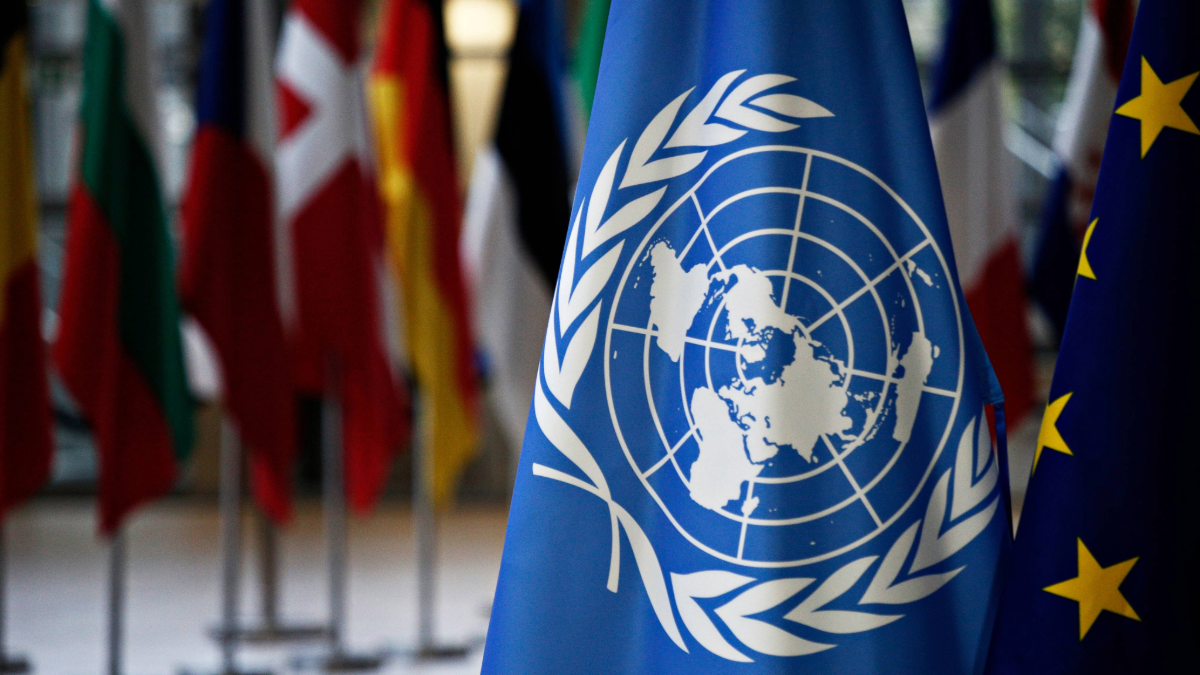Global Digital Compact for Democracy: How to Achieve a Democratic Digital Future?
Sebastian Becker Castellaro / May 2, 2024
The flag of the United Nations. Shutterstock
In 2024 more than 2 billion people worldwide will have the opportunity to cast ballots in democratic elections. The world’s most important conferences on Internet governance are also taking place this year, promising to determine the future of digital technologies and the Internet for the coming decade and beyond. One important venue for this discussion is the United Nations Global Digital Compact (GDC)—a once-in-a-generation opportunity to shape the principles of Internet governance. Given that this is a decisive electoral year and in light of the ongoing democratic decline around the world, these principles should have a strong democratic focus.
Why does the GDC matter for democracies?
The GDC – a UN initiative to review the prevailing digital governance architecture – was initiated in September 2020 with the support of 193 UN member states, and should be agreed upon at the 2024 Summit of the Future.
The zero draft of the Global Digital Compact was launched in April, and intergovernmental negotiations aimed at fostering an ‘inclusive, open, free and secure digital future’ are currently taking place to determine the final text. The first reading of the text will take place on May 2-3 to work out the details of the final wording. The GDC was inspired by the UN Charter, the Universal Declaration of Human Rights (UDHR), and the 2030 Agenda for Sustainable Development. The foundational principles outlined in these documents offer values and mechanisms to inspire a democratic digital future. For instance, the UDHR states that “periodic and genuine elections” ensure people’s ability to take part in the governments where “the will of the people shall be the basis for the authority of governments.” On top of that, the Sustainable Development Goals promote the improvement of fundamental freedoms, the rule of law, and participatory and representative decision making. In a nutshell democratic values and fundamental rights are deeply rooted in the GDC.
Building a GDC for democracy
The zero draft of the GDC, particularly its guiding principles, promotes a solid baseline to build a democratic digital future. Values such as gender equality, human rights, multi-stakeholderism, responsibility and accountability, among others, are relevant principles for achieving a human-centric digital future. Nevertheless, a close glance at the draft shows us that the GDC can go even further in its commitment to democracy and human rights.
Firstly, the section on digital public goods and infrastructure should focus on transparency, the rule of law, and rights, as these are important values for democracies. Moreover, as states undertake digitalization efforts, they should also conduct human rights and democratic impact assessments. Otherwise, the digital public infrastructure could become a repressive tool that states use to decimate rather than enable and expand citizens’ rights. As the GDC highlights, the digital future should be human rights-based; in other words, digital technologies should be harnessed in order to promote and protect people’s rights.
Secondly, information integrity is crucial to achieving an open, free and inclusive public debate in order to ensure effective participation in democracies and safeguard the integrity of elections. Both states and online social media platforms should implement measures to ensure access to diverse, accurate, trustworthy and reliable information, and avoid the dissemination of both disinformation and misinformation as well as hate speech. The concept of information integrity should encompass the idea of the free flow of information on the Internet. Thus, the information integrity principle in the GDC should promote not only trustworthy, balanced and reliable information but also an open, decentralized and diverse ecosystem of information. This entails, on the one hand, making sure that online platforms are held accountable for their impact on the information integrity during elections and, on the other hand, putting regulatory frameworks in place that prohibit general monitoring obligations on online platforms or penalties when platforms act in good faith and comply with due diligence obligations. In short, the GDC should entice social media platforms to implement measures to safeguard information integrity within their operations, and call on states to build legal frameworks to protect the free flow of information in the digital sphere, with special attention given to protecting elections and democratic debates.
Finally, the role of artificial intelligence (AI) governance will be crucial for the digital future of democracies. Generative AI products are likely to make it increasingly difficult for end users to identify accurate information in online spaces. Deepfakes and AI-driven disinformation campaigns to manipulate citizens will be part of the new informational ecosystem in online spaces. In the context of activities within the life cycle of AI systems, it is crucial to promote global and human-centric governance that includes a risk-based approach to identifying, assessing, preventing and mitigating human rights and democracy risks. AI should be governed by global standards anchored in international human rights law, the rule of law, and democratic values.
We are on a good path, but what about tackling the climate crisis in the GDC?
As highlighted, the 2030 Agenda for Sustainable Development is at the crux of the GDC negotiations, and tackling climate change is addressed in Sustainable Development Goal (SDG) No. 13: “take urgent action to combat climate change and its impacts.” In this vein the principle of environmental sustainability highlighted in the zero draft of the GDC does not align with either the SDGs or the role of technology in combating, mitigating and adapting to climate change.
The GDC has an opportunity (and, at this point, a duty) to propose a digital future to combat the climate and environmental crisis, taking into consideration, among other things, the extraction of raw materials, data centers’ use of energy and water, and the management of e-waste, in addition to other types of waste produced by digital technologies. Climate change poses existential threats to the development of countries, the exercise of human rights, and democracy; thus, a coherent and cohesive GDC should acknowledge the fight against climate change as one of its principles.
The GDC can play a major role in a crucial year for Internet governance
The GDC should be seen as part of a broader policy process that is shaping new rules for Internet governance, alongside events such as Net Mundial+10, the World Summit on the Information Society (WSIS+20) and the Internet Governance Forum (IGF), all set to take place this year. Moreover, the GDC will be included as an annex to the Pact for the Future in September 2024.
The GDC provides an opportunity for states to bridge gaps at the intersection between Internet governance and democracies, such as developing a digital policy agenda on climate change, artificial intelligence and social media accountability. It is also an excellent opportunity for civil society organizations uncomfortable with participating in the next IGF in Saudi Arabia to engage in this and other Internet governance discussions.
Finally, states should engage with the GDC process to emphasize the importance of meaningful multi-stakeholder participation in Internet governance, which can occur only where all actors can participate freely and safely – in other words, in countries where democratic values underpin digital policies.
Authors
